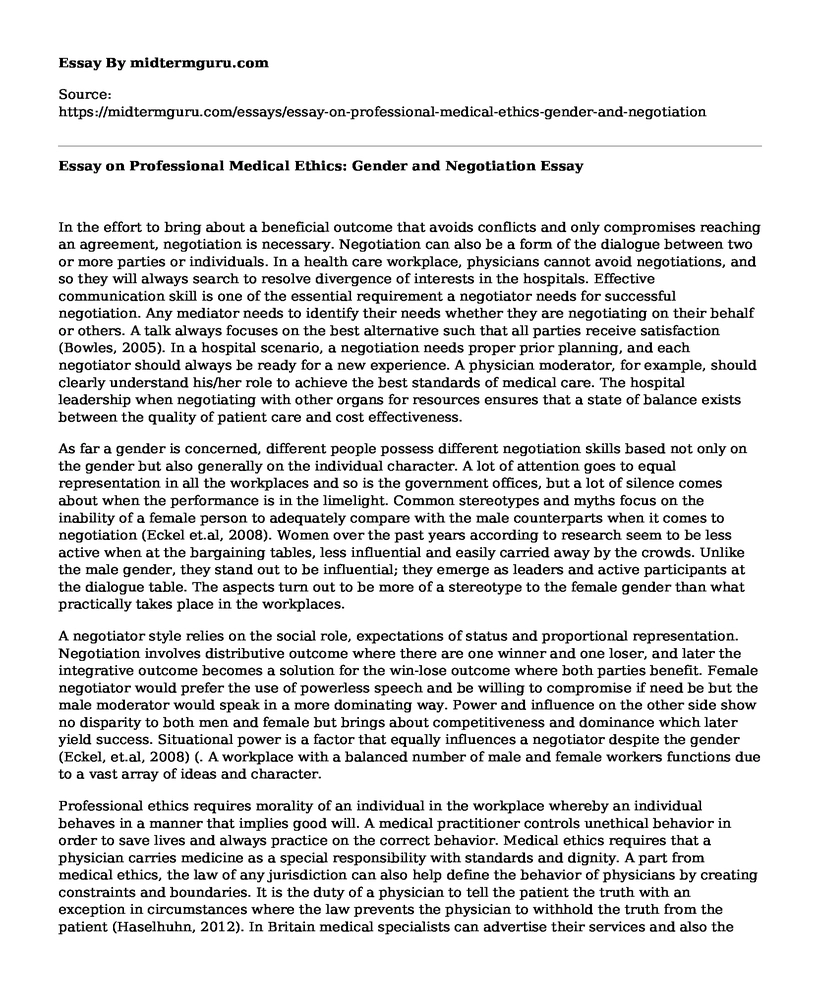In the effort to bring about a beneficial outcome that avoids conflicts and only compromises reaching an agreement, negotiation is necessary. Negotiation can also be a form of the dialogue between two or more parties or individuals. In a health care workplace, physicians cannot avoid negotiations, and so they will always search to resolve divergence of interests in the hospitals. Effective communication skill is one of the essential requirement a negotiator needs for successful negotiation. Any mediator needs to identify their needs whether they are negotiating on their behalf or others. A talk always focuses on the best alternative such that all parties receive satisfaction (Bowles, 2005). In a hospital scenario, a negotiation needs proper prior planning, and each negotiator should always be ready for a new experience. A physician moderator, for example, should clearly understand his/her role to achieve the best standards of medical care. The hospital leadership when negotiating with other organs for resources ensures that a state of balance exists between the quality of patient care and cost effectiveness.
As far a gender is concerned, different people possess different negotiation skills based not only on the gender but also generally on the individual character. A lot of attention goes to equal representation in all the workplaces and so is the government offices, but a lot of silence comes about when the performance is in the limelight. Common stereotypes and myths focus on the inability of a female person to adequately compare with the male counterparts when it comes to negotiation (Eckel et.al, 2008). Women over the past years according to research seem to be less active when at the bargaining tables, less influential and easily carried away by the crowds. Unlike the male gender, they stand out to be influential; they emerge as leaders and active participants at the dialogue table. The aspects turn out to be more of a stereotype to the female gender than what practically takes place in the workplaces.
A negotiator style relies on the social role, expectations of status and proportional representation. Negotiation involves distributive outcome where there are one winner and one loser, and later the integrative outcome becomes a solution for the win-lose outcome where both parties benefit. Female negotiator would prefer the use of powerless speech and be willing to compromise if need be but the male moderator would speak in a more dominating way. Power and influence on the other side show no disparity to both men and female but brings about competitiveness and dominance which later yield success. Situational power is a factor that equally influences a negotiator despite the gender (Eckel, et.al, 2008) (. A workplace with a balanced number of male and female workers functions due to a vast array of ideas and character.
Professional ethics requires morality of an individual in the workplace whereby an individual behaves in a manner that implies good will. A medical practitioner controls unethical behavior in order to save lives and always practice on the correct behavior. Medical ethics requires that a physician carries medicine as a special responsibility with standards and dignity. A part from medical ethics, the law of any jurisdiction can also help define the behavior of physicians by creating constraints and boundaries. It is the duty of a physician to tell the patient the truth with an exception in circumstances where the law prevents the physician to withhold the truth from the patient (Haselhuhn, 2012). In Britain medical specialists can advertise their services and also the doctors receive protection from the law in case of death and accidents because nobody can be morally responsible when misfortunes happen.
In conclusion, to fight gender disparity, organizations should avoid stereotypes that look at a given gender. Each at the negotiation table possess good character, is morally upright, is aware of the professional ethics and conscience about the law. Issues of gender should not relate to the ability to perform in the workplace, but each portrays the image of a responsible human being.
References
Bowles, H. R., Babcock, L., & McGinn, K. L. (2005). Constraints and triggers: situational mechanics of gender in negotiation. Journal of personality and social psychology, 89(6), 951.
Eckel, C., De Oliveira, A., & Grossman, P. J. (2008). Gender and negotiation in the small: are women (perceived to be) more cooperative than men?. Negotiation Journal, 24(4), 429-445.
Haselhuhn, M. P., & Kray, L. J. (2012). Gender and negotiation. The psychology of negotiations in the 21st century workplace: New challenges and new solutions, Taylor and Francis, New York, New York, 293.
Cite this page
Essay on Professional Medical Ethics: Gender and Negotiation . (2021, May 28). Retrieved from https://midtermguru.com/essays/essay-on-professional-medical-ethics-gender-and-negotiation
If you are the original author of this essay and no longer wish to have it published on the midtermguru.com website, please click below to request its removal:
- The Work Plan for Having a Mosquito Control Program
- Essay on Obesity in America
- Women's Rights, Animal Rights and Euthanasia Paper Example
- Paper Example on Nursing Professional Identity
- Social Work Administration - Essay Sample
- Nurses' Lived Experiences Caring for Pediatric Patients at End of Life - Research Paper
- Protecting the Public from HIV/AIDS: Vaccines & Interventions - Research Paper







